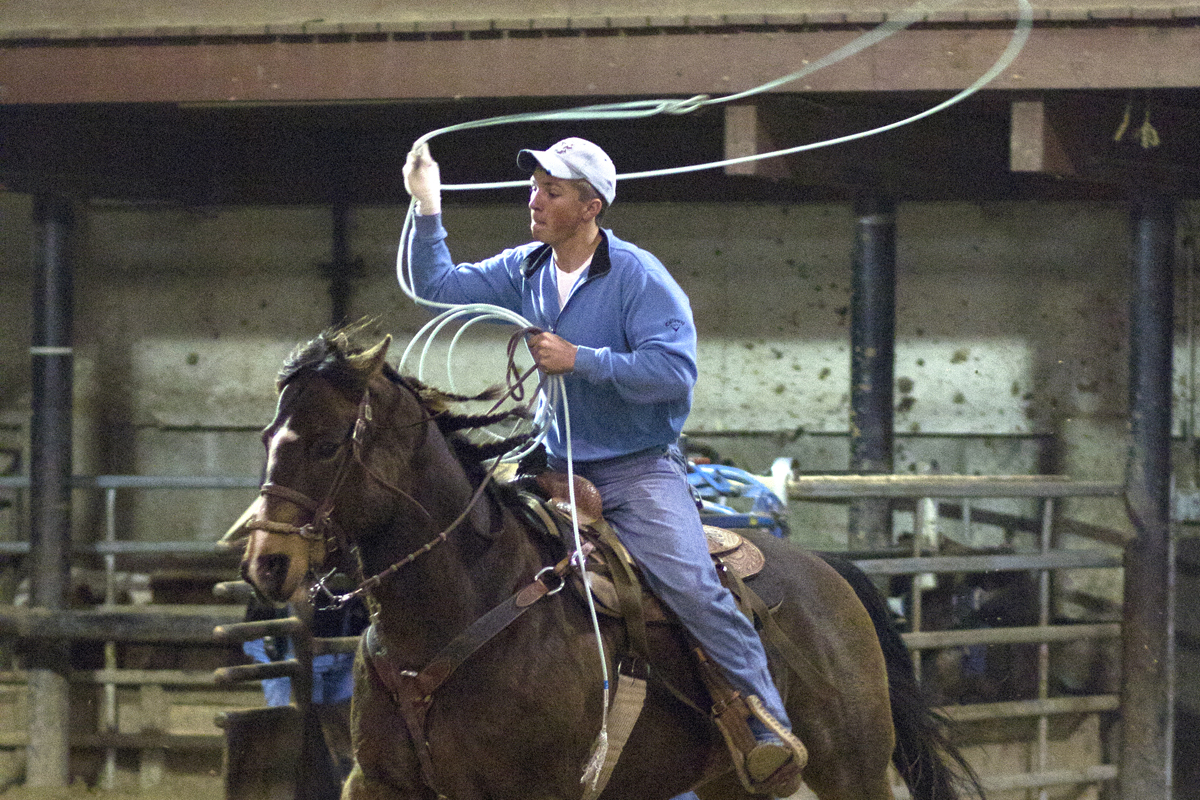Giddy up!
The USU Rodeo Club is getting back in the saddle for a fresh season of practices, competing and some good old-fashioned riding.
Team coach Jeffrey Hall, better known as “Doc,” said the club had an OK fall season, but is expecting for things to turn around for the spring season.
Hall said with new members starting last fall, he expects spring to be much better because the athletes are less nervous about competing at a collegiate level. This spring will also allow for more opportunity, with six rodeos taking place compared to the four that took place last fall.
Hall said the team consists of both male and female riders who become members of the National Intercollegiate Rodeo Association and compete in any of the nine events: bareback riding, bull riding, steer wrestling, tie-down roping, team roping, breakaway roping, goat tying, saddle bronc riding and barrel racing.
They must also compete against riders from the Rocky Mountain Region, including Dixie State College, Weber State University, Utah Valley University, College of Southern Idaho, Southern Utah University and Idaho State University.
Hall said several team members are currently ranked in the top five for their events and will have a good chance of placing in the top three and qualifying for the College National Finals Rodeo, held the second week of June in Casper, Wyo.
Rodeo Club president Garrett Thurston is currently holding first place and sitting on top of the region in team roping. His teammate Trevor Merrill is right on his heels with a close second place standing. Hall said every year he gets to send anywhere from two to five riders to nationals.
Thurston is a junior majoring in business at USU. He grew up locally in Hyde Park and has been roping for 13 years. He said his favorite event is team roping, and leading a team is nothing new to Thurston as he also served as his high school team’s president.
Thurston said what he likes most about being involved with the sport is the friends you make from all across the state.
“The friends you make in rodeo, you just can’t match them,” Thurston said.
He also said sometimes, his sport can be misunderstood and thought of as abusive.
“Every horse here probably gets treated better than the person riding it,” Thurston said.
Thurston said a good horse plays about a 90 percent role in what makes a good rodeo athlete, but the rest must come from the talent of the rider.
Club secretary Kate Clissold also said that rodeo could be misunderstood.
“We are not just a bunch of hicks; everyone here has a career goal and there are requirements that have to be met in order to ride,” she said.
Clissold is a sophomore and pre-veterinary major who grew up around horses. She also competed in rodeo in high school and prefers the event of breakaway roping.
“The club is fun to be in,” Clissold said. “We are kids that love to rodeo and it is a lifestyle that most people don’t understand. Horses just have a way of making you feel good.”
Thurston said members are required to keep a 2.0 GPA, be enrolled in at least 12 credits and have a NIRA membership. Club members must also be able to fund some of their own costs. Because rodeo is a club sport, USU does provide some funding, but each rider additionally seeks a sponsorship for the team.
Thurston said this requires members to be creative and proactive when seeking funding. Funds received pay for horse stalls, fuel and hotel costs, but other costs are usually fronted by the riders individually. An entrance fee can cost $125 per person, per weekend.
Hall is dedicated to the rodeo life as the team’s coach. Hall is a veterinary toxicologist and works at USU. He has been coaching the team for 14 years.
Hall grew up on a ranch in Oklahoma and found his talent for riding while showing cattle at a fair in Oklahoma City. The first bull Hall ever rode was actually mechanical. Later, Hall was asked to try riding a real bull and had success with all of the first three bulls he ever rode.
Without his parents’ approval, Hall took up riding, claiming it is an “adrenaline addiction.” He then went on to rodeo professionally for 19 years and used his earnings to fund his way through two doctorates. He said coaching the USU team is one of his ways to give back.
“Rodeo is a much different sport than people think,” he said. “In our sport, we help each other out even if we are from opposing teams, you want everyone to do good.”
The team will be looking for success together at their first spring rodeo, hosted by Weber State University from March 3-5 at the Golden Spike Colosseum in Ogden.
Thurston said everyone should try coming to a rodeo at least once because most like it and end up coming back.
“For me,” Thurston said, “The louder, the better.”
– jessie.a.sweat@aggiemail.usu.edu

